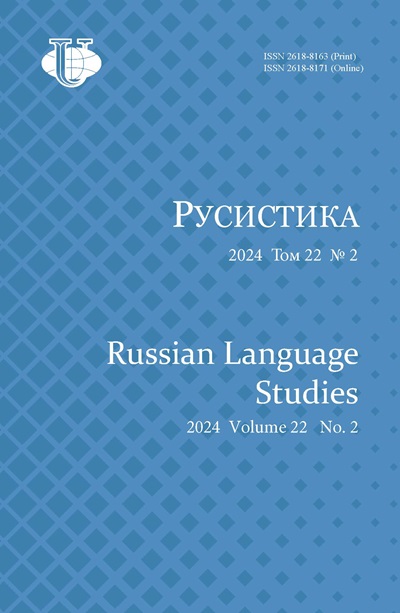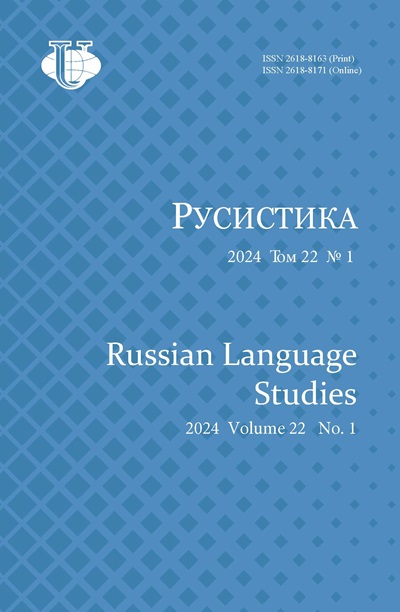Intersection of the lexical-semantic fields “Mentality” and “Physiology” in the poetic language of Igor-Severyanin
- Authors: Ivanova M.V.1, Shliakhova G.I.1
-
Affiliations:
- Maxim Gorky Institute of Literature and Creative Writing
- Issue: Vol 22, No 1 (2024)
- Pages: 73-90
- Section: Cultural Linguistics: Theoretical and Applied Aspects
- URL: https://journals.rudn.ru/russian-language-studies/article/view/39388
- DOI: https://doi.org/10.22363/2618-8163-2024-22-1-73-90
- EDN: https://elibrary.ru/PKNIEO
Cite item
Full Text
Abstract
The intersection of two lexical-semantic fields “mentality” and “physiology” in the poetic texts of Igor-Severyanin is studied. The relevance of the research is determined by the fact that within the framework of modern anthropocentric approach and increased attention to the mental sphere lexical semantics is investigated, lexical-semantic fields, their intersections, semantic shifts are considered, actual problems of linguistic poetics are touched upon. The aim of the work is to explore the intersection of lexical-semantic fields “mentality” and “physiology” in the language of Severyanin's poems. The material includes lexemes of the mental sphere from Igor-Severyanin's poetic texts. While determining the usual meaning of these lexemes, the authors used the materials of “Explanatory Dictionary of the Russian Language” by S.I. Ozhegov. The methods of description, comparison, contrast, lexical-semantic and contextual analysis, and continuous sampling were applied; the lexical-semantic field - a generally accepted form of representing lexical units by their meaning - was used to structure the vocabulary. The intersections of the lexical-semantic fields “mentality” and “physiology” in Igor-Severyanin's texts, revealed in the research, are primarily due to the inseparable connection between the inner world of man and his bodily organs of sense. The language fixes stable expressions indicating the possibility of comprehending the human consciousness through analyzing the signals of his body. Words used to denote phenomena and processes related to the body, health, gestures, etc., are reinterpreted in poetic language and receive new semantics, which allows to refer these new lexical-semantic units to the lexical-semantic field of mentality. In Igor-Severyanin's poems the inner world of the lyrical subject dominates, which is reflected in the author's word usage. Even words and expressions with the semantics of physiology shift in their meanings, acquiring the semantics of mentality, at the same time thoughts and feelings are endowed with the author's positive evaluation. The prospects of the research are connected primarily with further study of the mental sphere in the Russian linguistic lexical-semantic system, its dynamics, as well as with the analysis of semantic shifts in the poetic language vocabulary.
About the authors
Maria V. Ivanova
Maxim Gorky Institute of Literature and Creative Writing
Author for correspondence.
Email: dekanat@litinstitut.ru
ORCID iD: 0000-0002-6389-0827
Doctor of Philology, Full Professor, Dean of the Full-Time Faculty
25 Tverskoy Bulvar, Moscow, 123104, Russian FederationGalina I. Shliakhova
Maxim Gorky Institute of Literature and Creative Writing
Email: galine_24@mail.ru
ORCID iD: 0000-0001-6618-4074
postgraduate student
25 Tverskoy Bulvar, Moscow, 123104, Russian FederationReferences
- Abramov, V.P., & Abramova, G.A. (2017). Structural and functional approaches to semantic fields analysis. Russian Language Studies, 15(1), 9–25. (In Russ.) https://doi.org/10.22363/2313-2264-2017-15-1-9-25
- Akhmedova, Yu.A. (2007). Synesthesia as an element of idiostyle (on the example of Igor-Severyanin's lyrics). Development of the University Complex as a Factor of Increasing the Innovative and Educational Potential of the Region: Proceedings of Scientific and Practical Conference (pp. 11–18). (In Russ.) Retrieved December 28, 2021, from http://www.poet-severyanin.ru/library/sinestezia-kak-element-idiostilya.html
- Antonova, E.N. (2023). Intertextual character of poetic philological discourse. RUDN Journal of Language Studies, Semiotics and Semantics, 14(1), 245–259. (In Russ.) https://doi.org/10.22363/2313-2299-2023-14-1-245-259
- Antonova, N.A. (2013). Contradiction figure of speech as a constructive and semantic means (the case-study of Igor Severyanin’s poetry). RUDN Journal of Language Studies, Semiotics and Semantics, (2), 121–128. (In Russ.)
- Barashkina, E.A. (2007). Metaphorization as a way of linguistic nomination of mental sphere components. [Author’s abstr. cand. philol. diss.] Samara. (In Russ.)
- Bondarko, A.V. (2002). Theory of meaning in the system of functional grammar: Based on the material of the Russian language. Moscow: Yazyki Slavyanskoy Kultury Publ. (In Russ.)
- Caselli, N.K., Emmorey, K., & Cohen-Goldberg, A.M. (2021). The signed mental lexicon: Effects of phonological neighborhood density, iconicity, and childhood language experience. Journal of Memory and Language, 121. https://doi.org/10.1016/j.jml.2021.104282
- Denisenko, V.N. (2002). The semantic field as the lexical category and the method of the analysis of the language. Russian Journal of Linguistics, (3), 48–55. (In Russ.)
- Denisenko, V.N. (2003). Semantic field and systematic study of vocabulary (theoretical and applied aspects). Russian Word in World Culture: Proceedings of the X Congress of the International Association of Teachers of Russian Language and Literature. The Conceptrosphere of the Russian Language: Constants and Dynamics of Changes (pp. 307–312). St. Petersburg: Polytekhnika Publ. (In Russ.)
- Eiswirth, M.E. (2022). Making the invisible visible: Sociolinguistics meets medical communication in a travelling exhibition. Journal of Sociolinguistics, 26(5), 568–585. https://doi.org/10.1111/josl.12516
- Filin, F.P. (1982). About lexico-semantic groups of words. Essays on the Theory of Linguistics (pp. 229–239). Moscow: Nauka Publ. (In Russ.)
- Gridina, T.A. (2017). Grammatical “creative” in the poetry of Igor Severyanin. Grammatical Studies of the Poetic Text: Proceedings of the International Scientific Conference (pp. 41–43). Petrozavodsk: PGU Publ. (In Russ.)
- Grigoryev, V.P. (1990). Experience describing idiosyncrasies. Velimir Khlebnikov. Essays on the History of the Language of Russian Poetry of the 20th Century. Poetic Language and Idiostyle (pp. 96–164). Moscow: Nauka Publ. (In Russ.)
- Guiraud, P. (1964). La sémantique. Paris: Presses Universitaires de France.
- Gulina, E.V. (1918). The role of neologisms in the speech culture and poetry of Igor Severyanin. Project Activity and Scientific Research of Students: Materials of the Scientific and Practical Student Conference (pp. 99–102). Voronezh: Sreda Publ. (In Russ.)
- Hardy, Ch. (1997). Semantic fields and meaning: A bridge between mind and matter. World Futures, 48, 161–170.
- Ignatyeva, M.M. (1995). I. Severyanin’s poetic language. Russian Journal of Linguistics, (2), 24–36. (In Russ.)
- Iomdin, B.L. (2002). Vocabulary of irrational understanding. [Author’s abstr. cand. philol. diss.] Moscow. (In Russ.)
- Ivanova, M.V. (1986). Alphabetical frequency index of word forms “The Life of Stefan Permsky” (deposited manuscript no. 24353 from 03.03.1986, INION). Moscow. (In Russ.)
- Ivanova, M.V. (1987). The vocabulary of the “Life of Stephen of Perm”, written by Epiphanius the Wise (Candidate dissertation, Moscow). (In Russ.)
- Ivanova, M.V., & Zhanalina, L.K. (2019). Meta-linguistic and linguistic notes about speech consciousness. Russian Word in Multilingual World: Proceedings of XIV Congress of MAPRIAL (pp. 441–447). St. Petersburg: MAPRYAL Publ. (In Russ.)
- Kezina, S.V. (2004). Semantic field as a system. Filologicheskiye Nauki, (4), 79–86. (In Russ.)
- Khashimov, R.I. (2015). Semantic field of words and its elements. Filologicheskie Nauki. Voprosy Teorii i Praktiki, (4), 209–213. (In Russ.)
- Khodan, M.V. (2003). Lexico-semantic means of expressing the author's expression in the poetic language of Igor Severyanin (Candidate dissertation, Moscow). (In Russ.)
- Korshunova, T.N. (1999). Lexico-semantic means of expressing the author's expression in the poetic language of Igor Severyanin (Candidate dissertation, Orel). (In Russ.)
- Kuznetsova, A.I. (1963). The concept of the semantic system of language and methods of its research (from the history of the development of this problem in foreign linguistics). Moscow: MGU Publ. (In Russ.)
- Leeuwen, N.V., Weisman, K., & Luhrmann, T.M. (2022). To believe is not to think: A cross-cultural finding. Open Mind, 5, 91–99. https://doi.org/10.1162/opmi_a_00044
- Matveyeva, E.N. (2008). The communicatively conditioned aesthetic meaning of a word in poetry (based on the poetry of Igor Severyanin) (Candidate dissertation, Blagoveshchensk). (In Russ.)
- Moreno, I.M. (2020). The mental lexicon: A contrastive analysis of motion verbs in English and Spanish. Cádiz: Universidad de Cádiz.
- Ogneva, E.A. (2022). The theory оf cognitive modeling literary text space. Issues of Cognitive Linguistics, (2), 37–49. (In Russ.) https://doi.org/10.20916/1812-3228-2022-2-37-49
- Petrova, O.O. (2020). Types of metonymic transfers in the poetry of Igor Severyanin. Kazan Science, (1), 44–47. (In Russ.)
- Popova, Z.D., & Sternin, I.A. (1984). Lexical system of language. Voronezh: VSU Publ. (In Russ.)
- Segui, J. (1992). Le lexique mental et l'identification des mots écrits: Code d'accès et rôle du contexte. Langue française, (95), 69–79.
- Shchur, G.S. (1974). Field theories in linguistics. Moscow: Nauka Publ. (In Russ.)
- Sinelnikova, L.N. (2023). Emotions in the mental and linguistic space of lyric poems. RUDN Journal of Language Studies, Semiotics and Semantics, 14(2), 466–482. (In Russ.) https://doi.org/10.22363/2313-2299-2023-14-2-466-482
- Vladyko, N. (2016). The Image of durak in the Russian language (a comparative analysis of the psycholinguistic and lexicographic meanings of the word). NSU Vestnik. Series: Linguistics and Intercultural Communication, 14(4), 51–59. (In Russ.)
- Zock, M., De Deyne, S., Stella, M., & Pirrelli, V. (2022). The mental lexicon, blueprint of the dictionaries of tomorrow: Cognitive aspects of the lexicon. Frontiers in Artificial Intelligence, 5. https://doi.org/10.3389/frai.2022.945705
- Zolotova, G.A., Onipenko, N.K., & Sidorova, M.Iu. (1998). Communicative grammar of the Russian language. Moscow: MGU Publ. (In Russ.)















